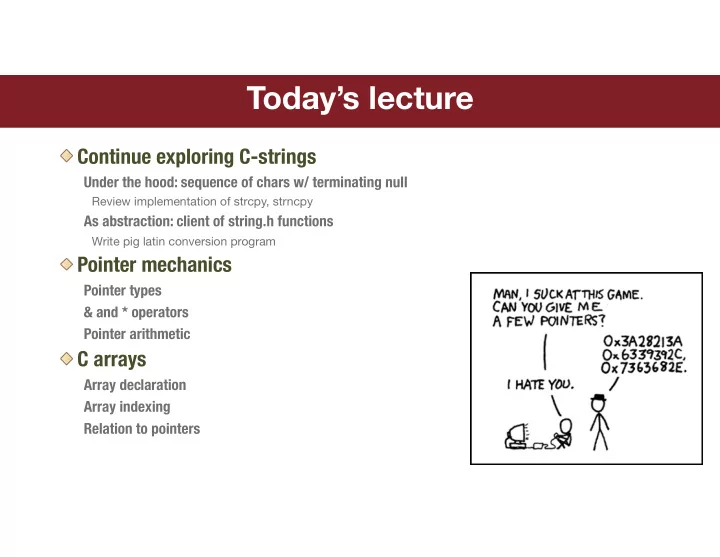

Today’s lecture Continue exploring C-strings Under the hood: sequence of chars w/ terminating null Review implementation of strcpy, strncpy As abstraction: client of string.h functions Write pig latin conversion program Pointer mechanics Pointer types & and * operators Pointer arithmetic C arrays Array declaration Array indexing Relation to pointers
/afs/ir/class/cs107/samples/lect4 char *my_strcpy(char *dst, const char *src) { char *result = dst; while ((*dst++ = *src++)) ; return result; } char *my_strncpy(char *dest, const char *src, size_t n) { // from man page size_t i; for (i = 0; i < n && src[i] != '\0'; i++) dest[i] = src[i]; for ( ; i < n; i++) dest[i] = '\0'; return dest; }
Let’s code! /afs/ir/class/cs107/samples/lect4/pig.c Pig latin: be => ebay trash => ashtray one => oneway Helpful string.h functions to consider: strcspn strcat, strncat
Why pointers? Pointers facilitate sharing, efficiency Linked data structures (lists, trees, graphs) Efficiently pass/return without making additional copies Avoid redundancy in data structures, link to one version of truth In C, pointers are ubiquitous Access specific memory location by address (e.g. system peripherals) Use for pass by reference (manual, not automatic) Arrays are implemented as pointers C-strings are arrays of char Dynamic memory accessed via pointer Function pointers
Meet your address space Divided into segments by purpose Access to invalid memory location results in "segmentation fault"
Pointer basics Address: is a memory location, represented as unsigned long Pointer: is a variable that holds an address Data stored at address is called the "pointee" (my made-up word; placeholder for actual type such as char/int/struct student) & address-of Apply to variable to get its address, i.e. &var is location in memory where var is being stored * dereference Apply to address/pointer to access pointee Same syntax to read and write, *p = *q Can manipulate address numerically Limited to equality/relational ops and add/subtract offset
C pointer types C type system Each variable declared with type Type determines size of storage and valid operations Operations required to respect that type Can’t multiply two char *s, can’t deference an int Co-mingle distinct types accepted if "sensible" automatic conversion exists Pointer variables distinguished by type of pointee Dereferencing int* yields an int, dereferencing char * yields a char Pointer arithmetic on int* scales by sizeof(int), on char * scales by sizeof(char) Types are compile-time (no runtime checking) If use typecast to subvert CT check, no RT error on mismatch
C arrays Array is sequence of elements, homogenous type int arr[5]; Allocates space for 5 ints, contiguous memory, indexed from 0 to 4 Subscript to access individual elements arr[0] = 72 arr[1] = 45 What happens if subscript invalid? arr[99] = 10 arr[-1] = 3 Can assign array to pointer — what does this do? int *ptr = arr; Use of array name "decays" to address of first element, e.g. arr is equivalent to &arr[0] Array contents not copied on assignment, ptr assigned address in memory where arr stored ptr and arr are now "aliases", refer to same memory
Pointer arithmetic, array indexing Array indexing is "syntactic sugar" for pointer arithmetic ptr + i <=> &ptr[i] *(ptr + i) <=> ptr[i] Arithmetic scaled by sizeof(pointee) ptr + 1 adds one if ptr is char *, what if ptr is int *? What happens if you cast to different size pointee before arithmetic? Either syntax on either pointer or array Can use subscript on pointer variable or pointer arithmetic on array Access to nth element in either always takes into account size of pointee
Pointer versus array Similar…. but not identical Consider C type system & draw pictures to visualize how underlying reality is same/different Operations in common Dereference, pointer arithmetic, array indexing Difference in declaration What space is allocated and what does memory diagram look like? Array declaration set aside space for N elements Pointer declaration is single variable to hold address Difference in operations Can reassign the pointer to hold a different address, not so with array arr = NULL doesn’t even compile — why not? What is sizeof(ptr)? what is sizeof(arr)?
Recommend
More recommend